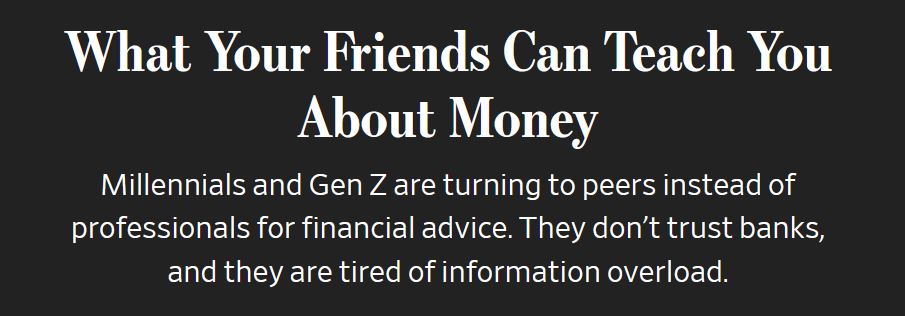

WSJ: What Friends Can Teach About Money
WSJ: What Friends Can Teach About Money
Interesting article about how Gen Z and Millennials learn about managing money. The author does seem to have missed a few things.
A friend offered to pick up the whole tab on her credit card, “for the points.” At the time, six years ago, “for the points” meant nothing to Saint-Vil, now a 30-year-old planning manager in Brooklyn, so he pressed for more details. They lingered over the dim sum meal as a larger conversation unfolded about annual percentage rates, credit-card debt, payment schedules and more.
People don’t talk about money as much as they should. Plenty of people are eager to tell you what you should do, but that doesn’t sink in because context and background are left out. Also, when told what to do, many people stop listening. People learn with narratives. That’s why the Bible is full of parables. Stories are engaging and nonthreatening. Children listening to adults talking are much more likely to soak up any wisdom.
In the excerpt from the article, Saint-Vil could have figured much of this out on his own. Every credit card statement has all the financial terms spelled out quite clearly. Saint-Vil didn’t bother to read it or think about it. Gen Z and Millennials may be need to be told to think about it.
Millennials and members of Gen Z prefer to seek financial advice from each other than from parents or from financial professionals. They don’t like overwhelming spreadsheets and marketing material written in seemingly foreign languages.
Gen Z and younger Millennials could be lumped together as the “Herd Generation” born from 2000 to 2012. A generation coming of age with social media. They are in touch with a large number of people, and act like wisdom and logic can be crowd sourced. Talking to older family members, then doing their own research is not as appealing as doing what everyone else seems to be doing.
They don’t trust big banks and institutions trying to sell them on investment strategies—as many were raised around the late 2000s financial-crisis. And, they are not wrong: There is a lot to be learned from comparing numbers with peers—from sharing salaries to talking out big decisions like home or car purchases.
Big banks and financial institutions require that the individual do his own research and come to his own conclusions. The Herd Generation is more comfortable conforming with the herd mentality. Nobody can blame you if everyone else made the same mistake.
As of June 2023, Gallup polling revealed a historically low faith in U.S. institutions, with younger generations voicing high skepticism. According to Gallup, only 9% of respondents aged 18 to 34 expressed “a great deal” of confidence in banks; meanwhile, 47% and 28% said they have “some” or “very little,” respectively.
Confidence in banks to do what? When mortgage rates dropped to 3%, I asked my brother if he had refinanced his mortgage.
“No, we talked to our bank about it, and they didn’t think it was worth doing.”
As I recall, his rate was 6.75% and he had almost 20 years left to pay-off. No, one should not trust the bank to make decisions for you when they have a vested interest. When we ran the numbers, he refinanced.
If the Herd Generation doesn’t believe that money deposited in banks is insured by the FDIC, they are simply ignorant or irrational. Yes, there are limits to the FDIC and anything could happen, but the FDIC hasn’t failed to cover bank losses for 90 years.
Many young people still say they prefer do-it-yourself investing platforms like Robinhood and Acorns over traditional advisers at more established wealth-management firms.
Robinhood and Acorns are trending on social media. Fidelity and Vanguard aren’t. I’ve used Fidelity for forty years, and found them to be responsive, helpful and comprehensive. Fidelity just isn’t hip.
Fear and shame around being able to buy or accomplish as much as one’s parents might have financially can crop up when millennials talk to elders about their financial frustrations, said Jodi Kaus, director of Kansas State University’s student financial planning center, Powercat Financial. She’s found that lessons and advice from friends are often more constructive.
The “fear and shame” part may be real because the Herd Generation knows that they don’t have the grit, determination, skill and self-control to accomplish what their parents have accomplished.
How can advice from friends be more constructive? A friend who is roughly the same age, doesn’t have decades of experience and the long-term outlook that a parent might have. The friend is probably on the same social media and is a member of the herd.
At a certain point, however, talking solely to friends and peers for your financial lessons can be very limiting, said Sarah Behr, founder of Simplify Financial Planning in San Francisco. Relying on your social circle can also put a strain on those relationships; no one wants to be responsible for your disappointment when a financial decision that worked out well for them doesn’t fit as well in your own life.
Friends and peers may not be in your life in ten years. They may feel competitive or reluctant to lose respect by sharing their mistakes.
Innovation and emerging social trends can be an exciting investment opportunity, and appropriate for a small portion of a portfolio. Conservative or old-fashioned advice like, don’t carry a balance on your credit card, spend less than you earn, pay yourself first and invest regularly in an index fund, are still valid ways to build wealth, but not trending on social media.